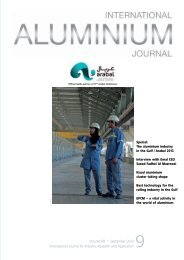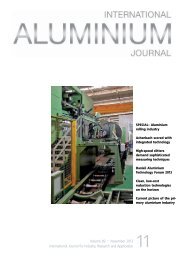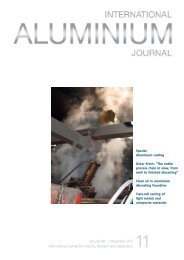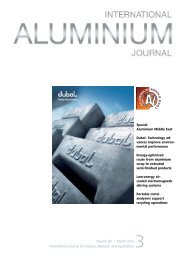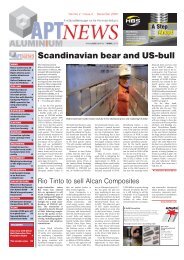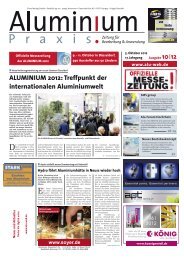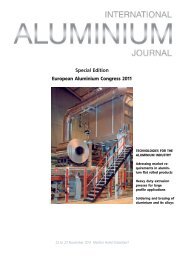SMS Siemag AG - Alu-web.de
SMS Siemag AG - Alu-web.de
SMS Siemag AG - Alu-web.de
You also want an ePaper? Increase the reach of your titles
YUMPU automatically turns print PDFs into web optimized ePapers that Google loves.
company news worldwi<strong>de</strong><br />
Bauxite and<br />
alumina activities<br />
mrn invests Usd45m<br />
to improve ore quality<br />
Brazilian bauxite miner Mineração Rio do<br />
Norte (MRN) will invest USD45m to increase<br />
the gra<strong>de</strong>s of its mined ores in a bid to cut<br />
costs and to increase returns. The project, currently<br />
at electromechanical installation stage,<br />
inclu<strong>de</strong>s replacing sieves and improving the<br />
plant’s pumping system. The work will take<br />
about two years and will save USD28.7m per<br />
year in costs and will improve ore quality.<br />
Average ore gra<strong>de</strong>s in 2012 stood at<br />
49.84% of usable alumina and 4.51% of reactive<br />
silica. After the investment, MRN expects<br />
to increase alumina gra<strong>de</strong>s by 0.35% and to<br />
reduce silica by 0.18%. The Brazilian miner<br />
produced 17.1m tonnes of bauxite in 2012,<br />
up 1.8% from 2011. Sold volumes amounted<br />
to 16.9m tonnes (-0.5%).<br />
indonesia’s move on bauxite<br />
exports roused china<br />
Indonesia’s move to change its mining laws<br />
was a wake-up call to China, its biggest customer<br />
for bauxite, and has led the Asian nation<br />
to reassess its supplies. Indonesia’s export<br />
restrictions showed that countries are seeking<br />
to add value to their raw materials rather<br />
than simply to export them. China imported<br />
around 80% of its bauxite needs from Indonesia<br />
in 2011, though this level slumped when<br />
Indonesia changed its mining laws to require<br />
companies to have export licences based on<br />
new criteria. As companies acquired licenses,<br />
exports resumed.<br />
But China had already started to look for<br />
alternative supplies, and so was also investigating<br />
ways to adapt its refinery technology to<br />
use different bauxite types. Many of its refineries<br />
had been built to take Indonesia origin<br />
bauxite, so adaptation of their technology is<br />
crucial. But integrating bauxite and alumina<br />
operations is not always the industry norm.<br />
Some of the world’s alumina production<br />
continues to operate at a loss, and much of<br />
this is located in China, particularly in its<br />
state-owned enterprises. These are vulnerable<br />
to cuts in the future. The price is going<br />
to drive the balancing of the market, either<br />
through closing the highest cost refineries or<br />
through adapting some of the refineries in<br />
China that have shown more flexibility.<br />
© Hydro<br />
indonesian bauxite exports<br />
to continue un<strong>de</strong>r new law<br />
The new system of exporting bauxite from<br />
Indonesia will begin from January 2014, as<br />
part of a government plan to exert greater<br />
control over its raw materials. The restrictions<br />
are not a ban, as has been wi<strong>de</strong>ly interpreted.<br />
The January 2014 date is the <strong>de</strong>adline by<br />
which companies must register and become<br />
certified. The new system is not a quota system,<br />
and there is no limitation to exports in<br />
volume terms. But the export law will allow<br />
Indonesia to track where its exports are going.<br />
The move was driven by the Indonesia’s<br />
<strong>de</strong>sire to participate further in its raw materials<br />
industry – which currently accounts for<br />
around 12% of its GDP.<br />
Indonesia’s bauxite <strong>de</strong>posits of around<br />
13.5m tonnes are in Bangka Belitung and in<br />
Northern Sumatra, Central Kalimantan and<br />
the Riau Islands. Continued exports from Indonesia<br />
will be a huge relief to China, which<br />
imported around 30m tonnes of bauxite or<br />
80% of its needs from Indonesia in 2011.<br />
orbite begins shipping commercial<br />
samples of high-purity alumina<br />
Orbite <strong>Alu</strong>minae Inc. has begun shipment of<br />
first commercial samples of high-purity alumina<br />
(HPA) produced at its HPA plant in<br />
Cap-Chat, Quebec. The samples in a range<br />
from 1 to 100 kg have a minimum purity of<br />
4N (99.99%). The company announced that it<br />
aluminium semis<br />
constellium gets bid for extrusion mills<br />
Downstream aluminium company Constellium<br />
has received a binding offer for two of its<br />
has already received over 25 confirmed or<strong>de</strong>rs<br />
for HPA samples ranging from 4N to 5N purity<br />
from clients throughout the world. ■<br />
recycling and<br />
secondary smelting<br />
sadoff iron & metal acquires<br />
aluminum resources<br />
Sadoff Iron & Metal Company has reached an<br />
agreement in principal to acquire <strong>Alu</strong>minum<br />
Resources, which is a processor and supplier<br />
of foundry and mill gra<strong>de</strong> recycled aluminium<br />
products. “This acquisition adds a niche market<br />
for us that compliments our current aluminium<br />
and nonferrous business activity,”<br />
said Sadoff CEO Mark Lasky.<br />
Foun<strong>de</strong>d in 1947, Sadoff is a third-generation,<br />
privately held ferrous, nonferrous, alloys<br />
and e-scrap recycling company with headquarters<br />
in Fond du Lac, Wisconsin. Including<br />
this acquisition, Sadoff has seven recycling<br />
facilities in Wisconsin, along with scrap<br />
metal operations in Omaha and Lincoln, Nebraska.<br />
The company provi<strong>de</strong>s scrap metal<br />
recycling services and solutions to industry,<br />
<strong>de</strong>molition contractors, and the public, along<br />
with ferrous and nonferrous melt products<br />
to foundries, steel mills and smelters. Sadoff<br />
conducts business in 37 states and exports to<br />
China, Mexico, South Korea, India and Canada.<br />
■<br />
extrusion plants in France from private equity<br />
firm OpenGate Capital. The plants, located in<br />
Ham and Saint-Florentin, specialise in making<br />
aluminium extrusions for the building and<br />
ALUMINIUM · 5/2013 61



